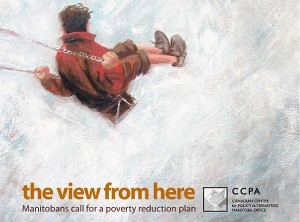Originally published in the Winnipeg Free Press, September 8, 2014. CCEDNet-MB members prioritized the policy areas discussed below, which are based on the following CCEDNet-MB policy resolutions: procurement, housing, and poverty reduction.
While election cycles bring some community challenges to the spotlight, the work creating solutions to these complex challenges is ongoing. Winnipeg’s inner-city neighbourhoods have been quietly transforming — creating employment, reducing poverty, reversing neighbourhood decline and preventing crime.
 The Merchants Corner will offer education and housing where a notorious hotel once stood; the Social Enterprise Centre is providing training and jobs to communities while improving housing stock; Neechi Commons is bringing fresh food where no other grocery store stands, along with stable and local jobs.
The Merchants Corner will offer education and housing where a notorious hotel once stood; the Social Enterprise Centre is providing training and jobs to communities while improving housing stock; Neechi Commons is bringing fresh food where no other grocery store stands, along with stable and local jobs.
Community organizations have been the driver of these success stories, but they thrive with supportive governments that move the policy levers and resources at their disposal.
The Province of Manitoba has taken significant steps to work with our communities. The City of Winnipeg has not.
When Winnipeg votes in municipal elections on Oct. 22, community leaders will be hoping for a change in approach at city hall that will see their efforts supported by an effective partnership with our municipal government, one that supports the effective work already being done.
Far too many Winnipeggers want to work, but don’t have the skills or opportunity to access jobs. Leaders in the community have responded by creating profitable businesses that address this challenge, called social enterprises.
Social enterprises are non-profit businesses with a social mandate, and Winnipeg has successful social enterprises providing training, support and jobs for people shut out of the workforce, whether due to a criminal record, a physical or intellectual disability, or having no high school diploma. Social enterprises have moved hundreds of Winnipeggers who would otherwise be unemployed into jobs, providing opportunities to support their families and contribute to their communities.
 Smart government policy can help these businesses grow to ensure anyone who wants to work has the opportunity.
Smart government policy can help these businesses grow to ensure anyone who wants to work has the opportunity.
If the City of Winnipeg would value the economic and social impact of its purchases, it would receive a better bang for its buck.
For instance, when the city hires renovators, it can contract social enterprises at the market rate who will provide training and jobs to at-risk individuals, thereby reducing costs to policing while breaking the vicious cycle of poverty. Purchasing from social enterprises provides the City of Winnipeg with a unique, long-term return on investment — savings through crime prevention, increases in tax revenue and healthy communities.
The Province of Manitoba, along with jurisdictions around the world — municipal, provincial and federal — have shown this approach to buying goods and services is achievable, and the resulting growth in social enterprises has demonstrated it works.
But a stronger social-enterprise sector providing jobs and training is not a silver bullet. Training and employment can be a pathway out of poverty, but we know success depends on a safe, affordable place to live.
Affordable housing is scarce in most major Canadian cities. Calgary has committed to supporting the development of 8,500 affordable housing units by 2018. Saskatoon has targeted 5,000 units over the next 10 years.
Winnipeg’s new housing plan commits to developing 75 affordable rental units over five years — 15 units per year. It has the resources to support the development of much more than this.
Community groups are calling on the City of Winnipeg to support the development of at least 350 new units of both social and affordable housing in Winnipeg over three years. The province has committed to developing 500 units of both social and affordable housing across Manitoba in the next three years. Groups such as Right to Housing have identified several ways the city can support these efforts without any budgetary changes, including planning and land use, land donations, inclusive zoning and tax-increment financing.
 The City of Winnipeg can be a powerful player in ensuring its communities and economic opportunities are inclusive to our vulnerable neighbours. Beyond housing and employment, action can be taken to ensure all have access to transportation, food security, recreation and social supports.
The City of Winnipeg can be a powerful player in ensuring its communities and economic opportunities are inclusive to our vulnerable neighbours. Beyond housing and employment, action can be taken to ensure all have access to transportation, food security, recreation and social supports.
Cities across Canada have created comprehensive plans guiding the actions they are taking to reduce poverty. Winnipeg has no comprehensive strategy, and community organizations have seen their good work slow due to funding cuts in recent budgets.
In 2009, the Province of Manitoba launched a poverty-reduction strategy. Community leaders have been asking the City of Winnipeg to take action and commit to a poverty-reduction strategy that partners with provincial efforts.
Communities know what they need to thrive. Citizens are finding innovative and effective ways to support their communities, and they will continue to make progress toward poverty reduction, safer neighbourhoods, better health and stronger local economies no matter who is elected. Together, we can do more and we can do it better. It’s time for the city to join us.
 Kirsten Bernas is Research and Policy Manager with CCEDNet in Manitoba. She received a BA (Honours) in Economics from the University of Manitoba as well as an MA from the Norman Paterson School of International Affairs at Carleton University in Ottawa. Kirsten represents CCEDNet on the Canadian Centre for Policy Alternatives‘ Alternative Federal Budget Steering Committee, Make Poverty History Canada’s Steering Committee, Make Poverty History Manitoba‘s Executive Committee, and on the Winnipeg Food Policy Working Group
Kirsten Bernas is Research and Policy Manager with CCEDNet in Manitoba. She received a BA (Honours) in Economics from the University of Manitoba as well as an MA from the Norman Paterson School of International Affairs at Carleton University in Ottawa. Kirsten represents CCEDNet on the Canadian Centre for Policy Alternatives‘ Alternative Federal Budget Steering Committee, Make Poverty History Canada’s Steering Committee, Make Poverty History Manitoba‘s Executive Committee, and on the Winnipeg Food Policy Working Group
Darcy Penner is a Research & Policy Advisor with the Canadian CED Network. He has been working in community development through various capacities since graduating from the University of Winnipeg with a BA (Honours) in Politics.
Darcy was also a contributing author to the Alternative Municipal Budget for CCEDNet-Manitoba.
 Newcomers and immigrant serving organizations in Saskatchewan have reason to celebrate with the recent announcement from the Government of Saskatchewan that they will be renewing the Immigrant Access Fund of Saskatchewan (IAF SK).
Newcomers and immigrant serving organizations in Saskatchewan have reason to celebrate with the recent announcement from the Government of Saskatchewan that they will be renewing the Immigrant Access Fund of Saskatchewan (IAF SK). 





 Kirsten Bernas is Research and Policy Manager with CCEDNet in Manitoba. She received a BA (Honours) in Economics from the University of Manitoba as well as an MA from the Norman Paterson School of International Affairs at Carleton University in Ottawa. Kirsten represents CCEDNet on the
Kirsten Bernas is Research and Policy Manager with CCEDNet in Manitoba. She received a BA (Honours) in Economics from the University of Manitoba as well as an MA from the Norman Paterson School of International Affairs at Carleton University in Ottawa. Kirsten represents CCEDNet on the 









 Recently, Beyond 2015 has published an analysis of the OWG document mentioned above. Beyond2015 Reaction to the Outcome Document of the Open Working Group on Sustainable Development Goals.
Recently, Beyond 2015 has published an analysis of the OWG document mentioned above. Beyond2015 Reaction to the Outcome Document of the Open Working Group on Sustainable Development Goals.




